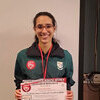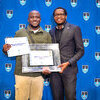New MOOC prioritises visually impaired learners
21 February 2020 | Story Niémah Davids. Photo Supplied. Read time 5 min.
The University of Cape Town (UCT) has added a new massive open online course (MOOC) to its portfolio of short courses to help educators who lack the skill sets to teach children with disabilities. The course will, among other things, enable teachers to nurture the intellectual and emotional well-being of these learners.
Tailored towards school-level educators, Teaching Children with Visual Impairment: Creating Empowering Classrooms offers teachers the insight they need to create classroom environments that accommodate the learning needs of visually impaired children. It aims to encourage moving away from segregated schooling towards a more inclusive and integrated approach to learning. This approach provides both teachers and learners with an opportunity to understand what it takes to teach and learn in this environment and in turn overcome the hurdles of the past.
The course forms part of UCT’s suite of online short courses created by the Disability Studies division’s Teacher Empowerment for Disability Inclusion (TEDI) project in partnership with the Christoffel-Blindenmission (CBM), an international Christian development organisation committed to improving the quality of life for people with disabilities in some of the world’s most marginalised communities.
SA in crisis
Senior research officer, and course convenor for UCT’s Disability Studies programme, Dr Brian Watermeyer, said the MOOC adopts a “first-person” experience and has been designed with both the visually impaired learner and the teacher in mind.
According to Watermeyer, South Africa faces a “crisis” when it comes to educating learners with disabilities.
“We are in an era of moving towards inclusive education.”
He said a whopping 600 000 disabled children are not part of a formal schooling programme and there has long been need for an “urgent” intervention. He said the course’s primary goal is to “demystify” visual impairments by illustrating that the needs of individuals with visual impairments are no different from those of able-bodied individuals.
“We are in an era of moving towards inclusive education. [Teachers] urgently need to be equipped with the skills to ensure a meaningful education for [visually impaired] learners.”
Inclusive teaching and learning
The research conducted by the TEDI project revealed that learners with disabilities, especially in under-resourced schools in South Africa, faced a long list of challenges in the classroom.
They weren’t alone – teachers’ challenges were similar. Providing quality education has not been possible because teachers struggle to understand the learning needs of visually impaired learners.
TEDI researchers found that the educational needs of learners with severe to profound sensory or intellectual impairments can only be addressed when teacher education supports teachers to do this.
In light of this, the short course will provide teachers with some “much-needed” support. It will help teachers to apply the Expanded Course Curriculum – a collection of content areas they can integrate into the core curriculum to give visually impaired learners access to the knowledge sighted learners gain through observation. Further, the MOOC also provides strategies on how to make the classroom, learning material and teaching methods more accessible.
Overcoming barriers
Lauren Butler, online learning designer at UCT’s Centre for Innovation in Learning and Teaching (CILT), said the programme was designed to help teachers familiarise themselves with the life of a learner with a visual impairment and “overcome some of the barriers of difference”.
Butler spent a full year working alongside academics to create the course.
“One of the main barriers [for] learners with disabilities is that [their] needs are not fully understood by teachers. Worldwide teachers lack skills in disability practice, preventing equal access and participation in class,” Butler said.
“Personal accounts will help teachers understand the complexities visually impaired learners face.”
During the four-week short course, visually impaired professionals will share their childhood classroom stories with teachers and discuss the challenges they experienced. Butler said these personal accounts will help teachers understand the complexities visually impaired learners face in the classroom.
“Teachers will get to intimately know the panellists who grew up with visual impairments and attended schools in different education environments,” Butler said.
“These insights can help teachers create inclusive and accessible teaching spaces, attuned to the needs of visually impaired learners.”
UCT now offers four MOOCs that aim to build the capacity of teachers and foster in-class participation among learners with disabilities. The other three courses are:
 This work is licensed under a Creative Commons Attribution-NoDerivatives 4.0 International License.
This work is licensed under a Creative Commons Attribution-NoDerivatives 4.0 International License.
Please view the republishing articles page for more information.



























































































































































































































































































































































































































































